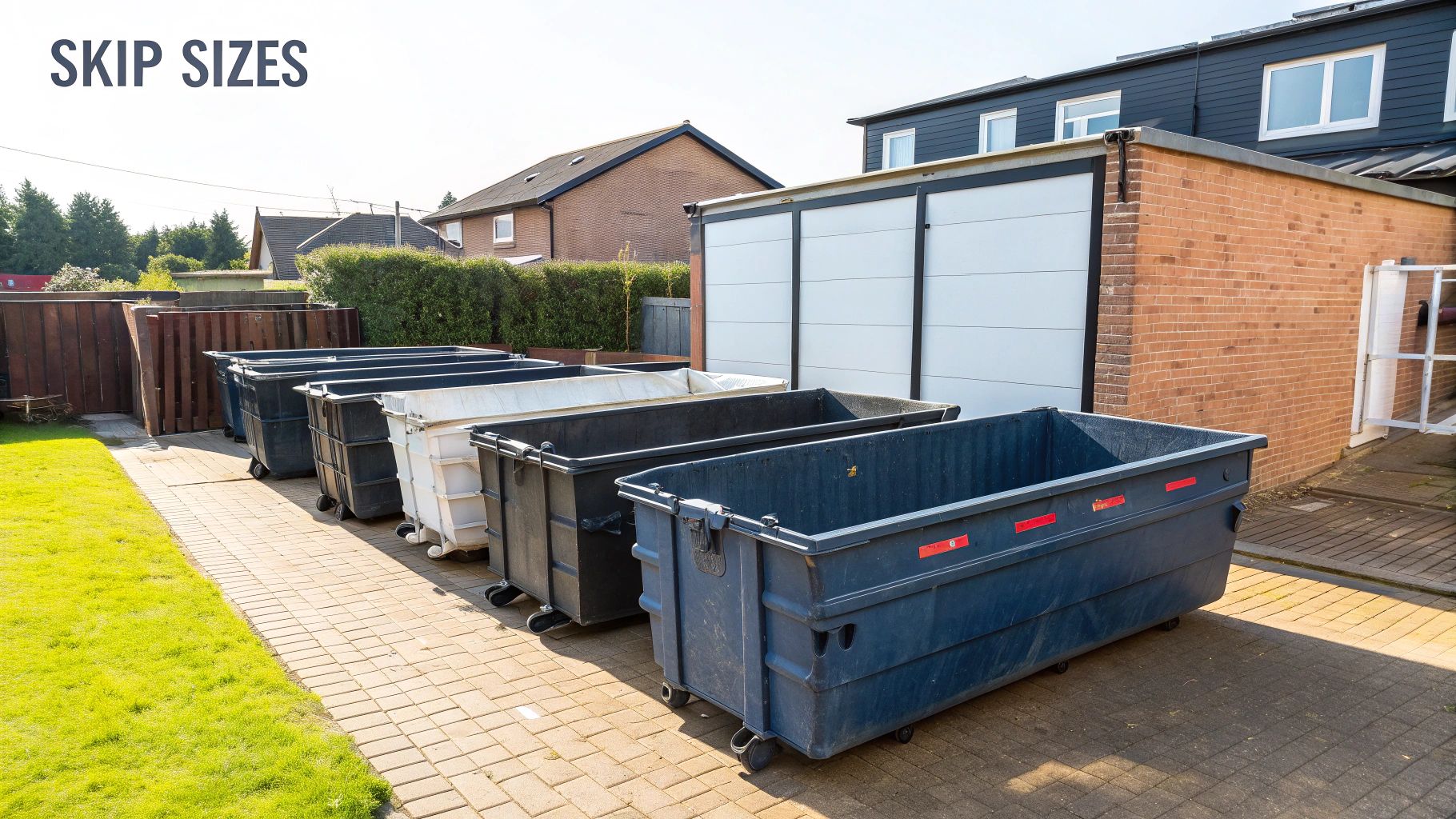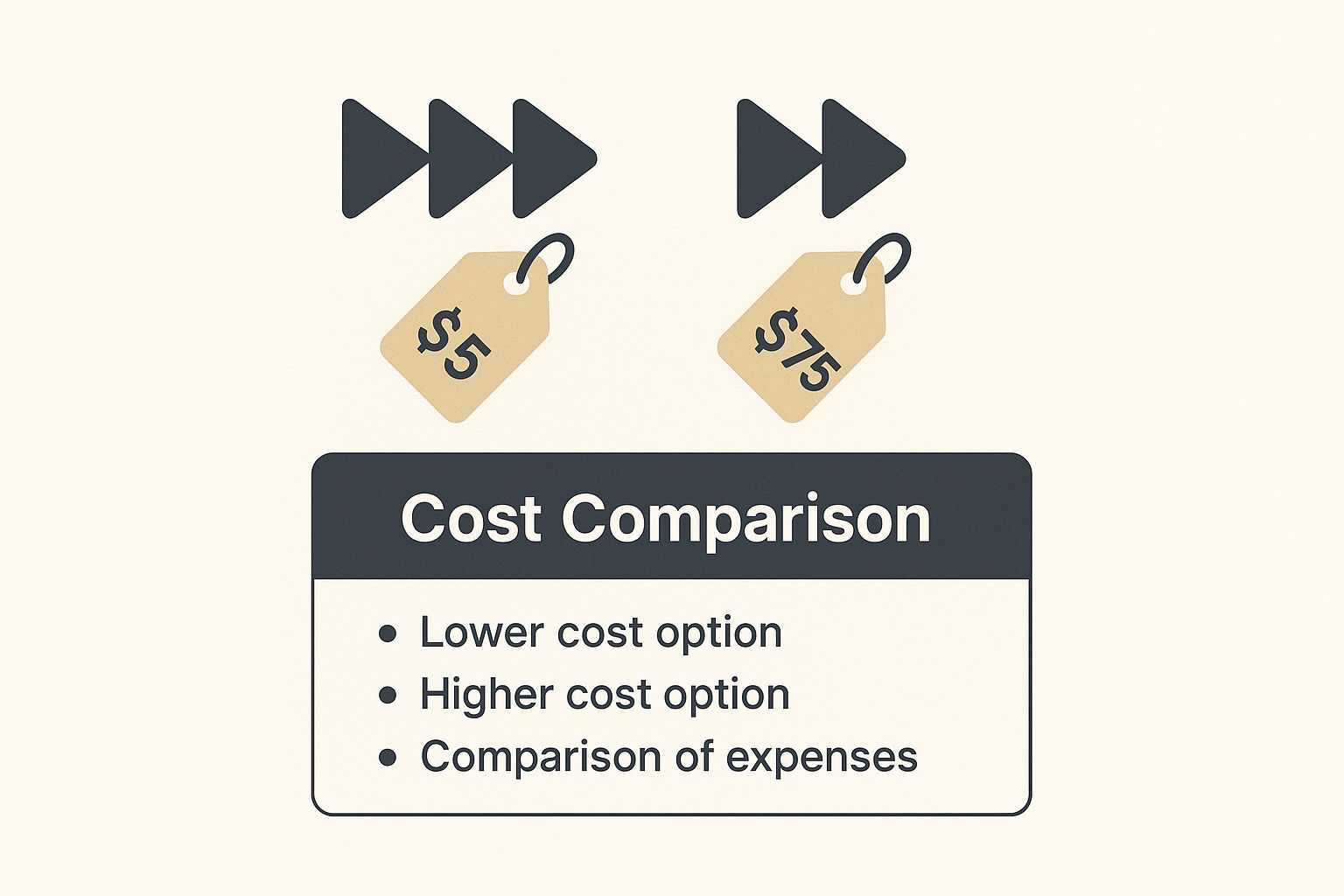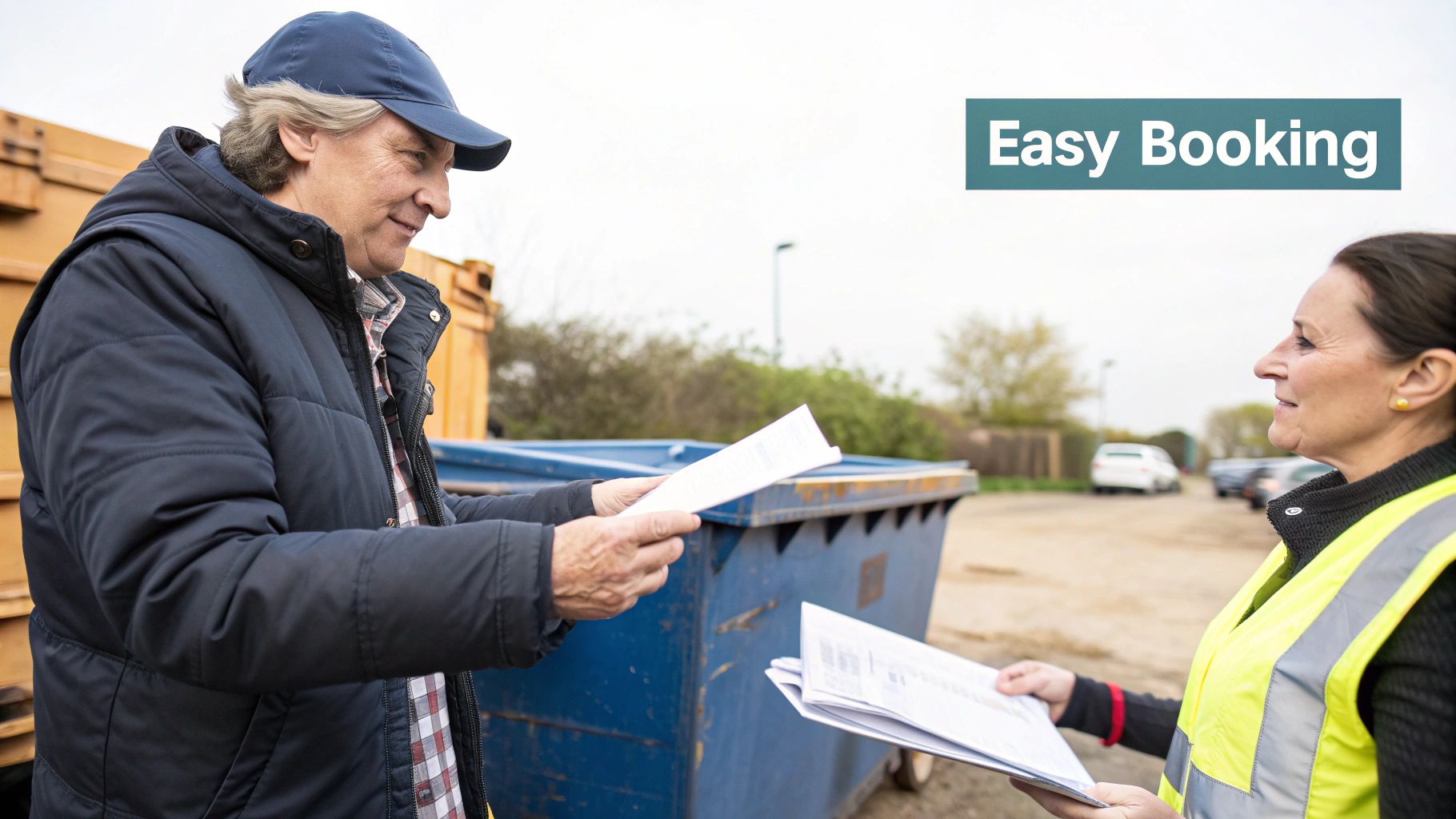Expert Skip Hire Dorset | Reliable and Affordable Service

Expert Skip Hire Dorset | Reliable and Affordable Service
If you're tackling a project in Dorset, you'll eventually hit one big question: what on earth do you do with all the rubbish? Whether you're ripping out a kitchen or finally clearing the garden, skip hire is almost always the most practical and cost-effective choice over countless trips to the local tip. It just makes managing waste for any size job that much simpler.
Your Starting Point for Skip Hire in Dorset

Hiring a skip in Dorset doesn't have to be a headache. It's really the go-to solution for dealing with the mess from all sorts of projects, from clearing out an old kitchen in Poole to a full garden redesign in Weymouth. Let's be honest, who wants to load up their car again and again? A single skip gives you one central spot for all your rubbish.
This isn't just about convenience. It saves a huge amount of time, fuel, and effort, letting you get on with the actual job. It's so easy to underestimate just how much waste a renovation or clear-out can create. A skip gives you the space to handle it all safely and in one go.
Why Is Everyone Hiring Skips These Days?
We've definitely seen a huge rise in demand for skips, particularly for home projects. With so many of us focusing on improving our homes, renovations have gone through the roof. Across the UK, around 17 million skips are hired every year, with homeowners and small builders making up the bulk of that.
This trend really took off a few years back. The home renovation sector saw a massive investment of roughly £50 billion in July 2020 alone. That boom directly translated into a need for proper waste management, and here in Dorset, we've seen a big increase in residential construction and landscaping jobs. You can dig into more UK waste management statistics on wearepinpoint.co.uk to see the bigger picture.
Hiring a skip is more than just making life easier; it's about managing your project properly. It keeps your site clear and safe, stopping waste from piling up and becoming a real hazard.
Before you even think about picking up the phone, it’s worth getting your head around a few key things that will make the whole process a lot smoother. This guide will walk you through the must-knows for any skip hire in Dorset:
- Choosing the Correct Skip Size: Getting this right is the key to not overspending.
- Understanding Waste Restrictions: Knowing what you can and can't throw in a skip will save you from surprise charges.
- Navigating Council Rules: If the skip is going on a public road, a permit is a legal must-have.
Choosing the Right Skip Size for Your Project
Picking the right skip size is probably the single biggest decision you’ll make when hiring one. Get it right, and your project runs smoothly. Get it wrong, and you’re either staring at a half-empty skip you’ve overpaid for or, even worse, scrambling to order a second one at the last minute. Trust me, that's a costly mistake.
Let’s put this in real-world terms. That small ‘mini’ skip? It’s perfect for the earth you’ve dug out from a garden makeover in Dorchester. But if you're ripping out a whole kitchen in Bournemouth, you’ll be looking at a much larger ‘builders’ skip. A great way to get your head around the volume is to think in standard black bin bags. It’s a simple trick, but it stops you from massively underestimating just how much stuff you actually have.
Getting a Handle on Your Waste Volume
The most important thing is to be brutally honest about how much waste you're going to produce. We often see people caught out by bulky items – an old sofa or a dismantled wardrobe takes up way more room than you'd think. On the other hand, dense rubble from smashing up a patio is incredibly heavy, which also affects your choice.
Before you do anything else, walk around the area and make a rough list of everything that's going. Try to group it in your mind: piles of wood, old kitchen units, soil, rubble. For instance, a standard bathroom renovation will probably generate 30-40 bin bags worth of waste once you account for old tiles, the suite itself, flooring, and all the packaging from the new stuff. A big garden clearance could easily top 50-60 bags.
Pro Tip: If you're stuck between two sizes, always go for the bigger one. The price difference between a 4-yard and a 6-yard skip is a drop in the ocean compared to the cost and hassle of hiring a second one.
This infographic gives you a good visual breakdown of how the costs stack up.

As you can see, while the bigger skips have a higher initial price, the cost per cubic yard is much lower. It’s all about value for money on larger jobs. For a more in-depth look at the numbers, have a read of our guide on understanding skip hire prices in Dorset.
Dorset Skip Size and Project Guide
To make the decision even more straightforward, we’ve put together this quick-reference table. It matches the most common skip sizes to the kinds of jobs we see every day across Dorset, so you can pick the right one with confidence.
| Skip Size (Yard) | Typical Project | Approx. Bin Bags | Ideal For Waste Types |
|---|---|---|---|
| 4 Yard 'Mini' | Small kitchen or bathroom refit, major garden clearance. | 30 – 40 | Soil, rubble, general household waste. |
| 6 Yard 'Small' | Bulky waste from house clearances, light construction waste. | 50 – 60 | Furniture, wood, light building debris. |
| 8 Yard 'Builders' | Standard choice for construction sites and large renovations. | 70 – 80 | Mixed heavy construction waste. |
| 12 Yard 'Maxi' | Large house clearances with lots of light, bulky furniture. | 100 – 120 | Large furniture, wood, light plastics. |
Hopefully, that gives you a much clearer idea of what you’ll need. Matching the skip to the waste type is just as important as matching it to the volume.
Navigating Dorset Council Skip Permit Rules

One of the biggest questions we get asked about skip hire in Dorset is always about permits. It can seem a bit complicated, but the rule of thumb is actually pretty simple.
If any part of your skip needs to sit on public land – that means the road, a grass verge, or the pavement – you will legally need a permit from Dorset Council. There’s no getting around it; it’s a crucial step to keep everyone safe.
On the other hand, if you’ve got a driveway, a front garden, or another bit of private property where the skip can fit comfortably, you're in the clear. No permit needed. This is definitely the path of least resistance if you have the space.
When a Permit is Absolutely Essential
So, how do you know for sure? You’ll need to sort out a council permit if you plan on placing the skip:
- On a public road: This is the most common scenario, especially for terraced houses or homes without a private drive.
- On a grass verge: Even the patch of grass right outside your gate is usually council property and considered public land.
- On a pavement or public footpath: Putting a skip here is possible but requires a permit to ensure pedestrians can still get by safely.
The good news? This isn't something you have to tackle yourself. Any reputable skip hire company worth its salt will handle the entire permit application for you. We know the process inside and out, what details the council needs, and how to get it sorted without any fuss on your end.
Bear in mind that permits don't appear instantly. Dorset Council usually needs a few working days to process an application, so it’s really important to book your skip hire well ahead of time if it needs to go on the road.
Understanding Permit Costs and Duration
The cost for a skip permit doesn't come from us – it's a set fee charged directly by Dorset Council. The price can change, but your skip hire provider will give you the current cost when you book.
A standard permit is usually valid for a set period, often between 7 and 28 days. If your project takes a bit longer than expected, you'll need to arrange for an extension, which might come with an extra charge.
It’s a smart move to factor this cost into your budget from day one. While popping a skip on your own driveway is free, the convenience of having it right outside on the road is often worth the permit fee, especially for bigger jobs where you need easy access. And whatever you do, don't be tempted to skip the permit – the fine for placing a skip on public land without one will be far, far higher than the cost of the licence itself.
What You Can and Cannot Put in Your Skip
Getting this part right is probably one of the most important aspects of hiring a skip. A simple mistake here can lead to a refused collection or some nasty unexpected charges, turning a straightforward job into a headache. It all boils down to safety and environmental rules.
Before you even think about lobbing things into the skip, it’s a good idea to have a sort-through of what you’re getting rid of. If the mountain of stuff feels a bit daunting, there are some great easy tips to get rid of household clutter that can help you get organised. Once you know what’s going, you need to know where it can go.
What Is Generally Allowed in Your Skip?
The good news is that for most projects, whether it’s a garden clear-out or a small renovation, the bulk of your waste is perfectly fine for a skip.
You can usually fill your skip with a mix of the following:
- General Household Waste: Think old furniture, knackered carpets, plastics, and all that general bric-a-brac from the loft.
- Garden Waste: Soil, grass cuttings, leaves, branches, and old bits of fence post are all acceptable.
- Construction Debris: This covers things like wood, metal, rubble, bricks, and concrete.
Mixing these materials is rarely an issue. However, if you’ve got a massive pile of one thing—like just soil or hardcore from digging up a patio—it’s worth mentioning it to us. Sometimes a dedicated skip for a single waste type works out cheaper.
Understanding the rules isn’t just about dodging fines; it’s about making sure your waste can actually be recycled. When you throw in something you shouldn't, it can contaminate the whole load, meaning everything has to go straight to landfill. It completely undermines the whole point of recycling.
Strictly Prohibited Items and Why
Some items are a definite no-go. They're classed as hazardous and need specialist disposal for good reason. Chucking them in a skip isn't just dangerous, it's illegal.
For the full rundown, check out our guide on what you can’t put in a skip. But, as a quick reference, these are the main culprits to keep out:
- Plasterboard: It contains gypsum, which can create a toxic gas when it mixes with other waste.
- Asbestos: This is a seriously hazardous material that needs a licensed specialist to remove it safely.
- Electricals: Fridges, freezers, TVs, and old computers are classed as WEEE (Waste Electrical and Electronic Equipment) and must be recycled separately.
- Tyres and Batteries: Full of harmful chemicals that can leak and cause environmental damage.
- Liquids: No paint, oil, solvents, or other chemicals. They can contaminate entire loads and leak into the environment.
Contamination is a massive headache for the waste industry. Right now, only about 47% of commercial skip waste in the UK gets recycled, a figure that has stubbornly refused to improve for years. With stricter rules in place, some recycling centres have seen rejection rates for contaminated skips rocket by 340%. It shows you how seriously this is being taken. By keeping prohibited items out, you’re doing your bit to help us all recycle more effectively.
Finding a Reliable Dorset Skip Hire Company
The success of your project can often come down to the quality of your suppliers, and your skip hire Dorset provider is certainly no exception. With so many options out there, taking a few minutes to check the essentials will save you a world of pain later on – think late collections, surprise fees, or worse, illegal waste disposal.
First off, any company you deal with absolutely must hold a valid Waste Carrier Licence. This isn't just bureaucratic red tape; it’s your guarantee that they are legally allowed to handle and transport your rubbish. Don't be shy about asking for their licence number. Any reputable firm will have it ready without a second thought.
Right alongside that, you need to check for public liability insurance. This is what protects you if any damage happens to your property when the skip is being dropped off or picked up. It's a fundamental sign that you're dealing with a professional and responsible outfit.
Look Beyond the Price Tag
It’s always tempting to go for the cheapest quote, but this shouldn't be your only consideration. A price that seems too good to be true often is. It can be a massive red flag that the company is cutting corners, which could mean your waste gets fly-tipped – leaving you on the hook for some seriously hefty fines.
Instead, look for a solid reputation and total transparency. A well-established local company with a proven track record in Dorset is almost always your best bet. Hunt down genuine customer reviews on independent sites to get a real feel for their service. While the UK skip hire market has about 520 major firms setting industry trends, what really matters for your project is the local company's reliability and financial health. For a more detailed look at the industry, you can explore the full analysis of the UK skip hire market.
Key Takeaway: Picking a reputable, licensed provider isn't just about getting good service. It's the only way to ensure your waste is managed legally and responsibly, protecting you and the beautiful Dorset environment.
What to Check Before You Book
Once you’ve got a shortlist, it’s time to get into the nitty-gritty of what they offer. Clear communication and straightforward terms are the hallmarks of a company you can trust.
Before you commit, make sure you get clear answers to these questions:
- Hire Duration: How long do you actually get the skip for? The standard is usually 7-14 days, but always confirm.
- Collection Policy: How quickly can they collect it once you're done? A flexible company should be able to arrange a pickup without a long wait.
- Weight Limits: Are there any weight restrictions? This is especially important for skips filled with heavy stuff like soil, rubble, or bricks.
- Pricing: Is the quote the final price? Double-check that it includes delivery, collection, and all disposal fees to avoid any nasty surprises later.
Taking these steps helps ensure you're partnering with a firm that genuinely cares about doing a good job. If you’re focusing your search on the county town, be sure to read our guide on arranging skip hire in Dorchester for more specific advice.
Pro Tips for a Hassle-Free Skip Hire Experience
Booking a skip is one thing, but making sure the whole process runs without a hitch is another. We've been in the skip hire in Dorset game a long time, and we've picked up a few tricks along the way. Getting the most from your skip really comes down to loading it smartly.
Think of packing a skip like a game of Tetris. You want to make the most of every last bit of space. Start by laying any large, flat items down first—things like old doors, broken-down wardrobes, or sheets of plasterboard. This creates a solid, even base.
With that flat foundation in place, you can start adding your heaviest, most awkward items. Think chunks of rubble, old appliances, or bulky garden waste. Once they're settled, you can fill in all the gaps around them with smaller bits and pieces. This method is brilliant for maximising space and stopping things from shifting around.
Mastering the Level Load Line
You’ll notice a 'level load' line painted on the side of every skip, and it’s there for a very good reason. Piling waste high above this line isn't just cheeky; it's dangerous. It poses a real risk to our drivers and anyone else on the road when the skip is being transported.
Crucial Tip: Don’t be tempted to build up the sides with your own bits of wood to squeeze more in. If our driver arrives and deems the load unsafe, they are legally obliged to refuse the collection. This will hold up your project and could even land you with extra fees.
Preparing Your Site for Delivery
A bit of prep work on delivery day makes a world of difference. If the skip is being placed on your driveway, it's a great idea to put down a few sturdy wooden planks first. This simple step helps to distribute the weight of the skip and protects your drive from potential scrapes or cracks.
Finally, a quick word with your neighbours is always appreciated. Just letting them know when to expect the skip lorry to arrive and depart is a common courtesy. It gives them a heads-up about the vehicle and any brief noise, which helps keep everyone on good terms.
A Few Final Questions About Skip Hire in Dorset
Even with the best-laid plans, a few questions can pop up when you’re hiring a skip. To make sure everything is crystal clear, here are the answers to some of the most common queries we get from customers across Dorset.
How Long Is the Standard Skip Hire Period?
Typically, the standard hire period for a skip in Dorset is anywhere between seven and fourteen days. This window usually provides more than enough time for most jobs, whether you’re clearing out the garden over a weekend or tackling a full-scale renovation.
That said, we know one size doesn't fit all. If your project has a unique timeline and you need the skip for a little longer, just have a word with us when you book. Most hire companies are happy to be flexible. And if you get the job done ahead of schedule? Just give us a call, and we can arrange an earlier collection.
What Happens If I Overfill the Skip?
This is a big one. Overfilling a skip is not just a minor issue – it's a serious safety hazard and a legal problem. Our drivers are legally forbidden from carrying a load that isn’t level and secure because of the danger it poses to other drivers on the road.
If a skip is filled past the level load line, our driver will have to refuse the collection until you’ve removed the excess waste. This can really throw a spanner in the works for your project schedule, and you might even face an extra charge for the wasted journey. It’s always best to play it safe and stay within the marked limits.
Our top tip: If you're on the fence about whether all your waste will fit, it's always smarter and more cost-effective to order a slightly larger skip from the get-go. It saves you the headache and potential extra costs of dealing with an overfilled skip later on.
Do I Have to Be Home for Delivery and Collection?
Nope, you don't usually need to be there, which is brilliant for keeping your day free.
As long as you’ve given us clear, detailed instructions on exactly where the skip needs to go and the access is completely clear of any obstructions, our driver can handle the drop-off without you. The same goes for collection – just make sure the lorry can get to the skip without any cars or other obstacles in the way. It makes the whole process a breeze.
Ready to get your project started without any fuss? At The Waste Group, we’re all about making skip hire in Dorset simple and reliable. Get your instant quote and book online in minutes.

